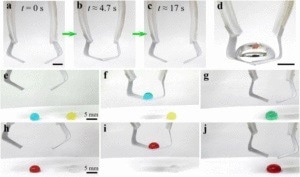
These photos, which accompanied the Materials Horizons article, show the droplet manipulator’s ability to work with a variety of different liquids. Image Credit: Colorado State University
The achievement is the result of a partnership between two distinct laboratories in the mechanical engineering department of CSU. Soft robotics and extremely omniphobic coatings were two applied technologies that were combined to make it happen.
Nylon fibers and adhesive tape, two relatively cheap materials, are used to construct the soft robotic manipulator. An artificial muscle that is electrically active powers it. The combination can be used to create cheap, lightweight grippers that can handle delicate work while being 100 times more powerful than human muscle at the same weight.
The parts used to construct conventional robots are costly, heavy, and rigid and so are therefore inadequate for some jobs.
Contrarily, soft robots can be lightweight and offer a gentle touch that is challenging to achieve with conventional robots. They can be produced for a much lower price and are significantly lighter than their rigid cousins.
A single gripper as large as my finger is one or two grams, including the artificial muscle embedded. And it is inexpensive—just one or two dollars.
Jiefeng Sun, Study Co-First Author and Postdoctoral Fellow, Department of Mechanical Engineering, Colorado State University
The droplet manipulator is made possible by a novel superomniphobic coating applied to the soft robotic grippers. Even in dynamic circumstances where the contact surfaces are tilting or moving, the superomniphobic coating prevents wetting by nearly all types of liquids.
The coating can interact with droplets without releasing their surface tension, allowing the soft robotic manipulator to grasp, move, and release individual droplets as if they were flexible solids.
Associate Professor Arun Kota, who is currently at North Carolina State University, and Postdoctoral Fellow Wei Wang (currently an assistant professor at the University of Tennessee) created the superomniphobic coatings used in the droplet manipulator at CSU. The study also had contributions from Wang and Kota.
It is a very nice synergy between these two kinds of research. Dr Kota was working on this very good coating, and we were working on this soft robot, to manipulate droplets, so we figured out this might be a good combination.
Jianguo Zhao, Study Co-Author and Associate Professor, Mechanical Engineering, Colorado State University
The team struggled to receive attention from journal editors in the early stages of their research but had the chance to showcase the potential of their invention during the COVID-19 pandemic.
Sun added, “Because of the pandemic, handling dangerous infective materials is a hot topic. So, we added a blood manipulation experiment after the first revision. That kind of helped us to get through the review process.”
Exciting applications can be made from the combination of affordable materials and advanced capabilities. Human cleanup of many liquid spill situations can be risky because of toxicity, the possibility of contagion, or other environmental dangers.
In conclusion, these disposable droplet manipulators can perform precise, lossless liquid cleanup tasks previously not possible with robotics.
“It is a first, but it is also a very unusual example of a high-tech product that is not terribly expensive,” stated Zhao.
Soft skills: Researchers invent robotic droplet manipulators for hazardous liquid cleanup
Video Credit: Colorado State University
Journal Reference
Wang, W., et al. (2022) On-demand, remote and lossless manipulation of biofluid droplets. Materials Horizons. doi:10.1039/D2MH00695B.